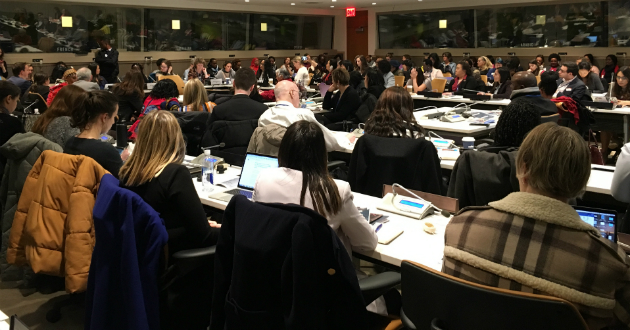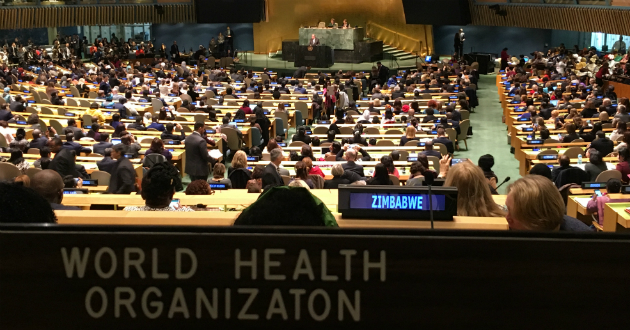
The session took place from 12-23 March 2018 at the United Nations Headquarters in New York with the participation of several representatives of UN Member States, UN entities, including WHO, and nongovernmental organizations from all regions of the world, on the theme of “Challenges and opportunities in achieving gender equality and the empowerment of rural women and girls”. Member States also negotiated and adopted the Agreed Conclusions outcome document, in which WUN ensured that health was prominently featured, particularly in relation to the health of rural women.
During the CSW plenary, Dr Maha El Adway, Director of Health Protection and Promotion in the WHO Regional Office for the Eastern Mediterranean, delivered a statement on behalf of WHO, addressing the most pressing health issues and barriers to accessing care faced by rural women and girls. Additionally, WHO co-sponsored 8 side events on the margins of the Commission, covering a range of health priorities for rural women: non-communicable diseases, nutrition, the health workforce, and violence against women.
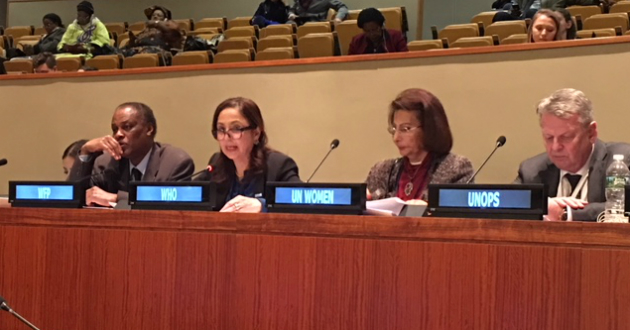
Breaking the Cycle of Injustice: Championing Health and Women’s Empowerment in Rural Settings to Address NCDs (Co-sponsored by Jamaica, WHO, PIH, NCD Alliance, and Women and NCDs Taskforce)
In the lead up to the 3rd High Level Meeting on NCDs to be convened this September, this side event examined NCDs as a barrier to gender equity, particularly in rural settings. Participants explored gender responsive approaches to NCDs and health across the life-course, including the integration of NCD interventions into existing maternal health programs, utilization of community health workers, and mHealth solutions, which have far reaching effects that greatly improve the lives of women, adolescents and girls from all walks of life. Ms. Sophie Evekink of WHO shared a global perspective of this issue, highlighting the links between NCDs and Reproductive, Maternal, Newborn, Child and Adolescent Health (RMNCAH).
The voice of rural women for a sustainable and healthy future (Co-sponsored by Italy, Zambia, and WHO)
This event provided a platform to enhance the exchange of good practices among rural women, national Governments, international Institutions, NGOs and other stakeholders. Panelists, including Her Honour Madam Inonge Mutukwa Wina, VP of Zambia, and Mr. Werner Obermeyer of WHO, explored the value of existing instruments as well as innovative initiatives to improve the conditions of women in agriculture, advocate for political leadership and seek opportunities to mobilize new resources for rural women and girls’ nutrition under the Decade of Action on Nutrition.
Investing in the rural health workers for the economic participation and empowerment of rural women and girls (Co-sponsored by Ireland, WHO, ILO, Women in Global Health)
The panelists at this event explored the transformative power of women – as 70% of the health and social workforce – to achieve gains across the Sustainable Development Goals. Panelists highlighted the need to address the18 million health worker shortage by 2030 in order to achieve UHC. Dr. Tana Wuliji of WHO highlighted examples of successful national programs, such as the rural health worker pipeline project in Guinea. Additionally, two rural health workers, from Kenya and Brazil, captured the unique needs and sacrifices of rural health workers, as well as their contributions in rural communities.
Advancing Women's Health and Well-Being Using Information and Communication Technologies (ICTs), Focus on Non-Communicable Diseases (NCDs) (co-sponsored by Jamaica, Thailand, WHO, ICW-CIF, CCCUN, CMH, PPSEAWA, Human Rights Congress for Bangladesh Minorities)
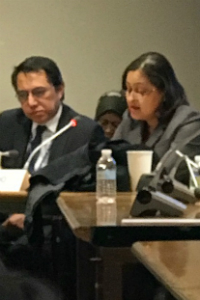
This event focused on the use of traditional and newer technologies in promoting women’s health, with a particular focus on non-communicable diseases and mental disorders such as depression. Participants further stressed the importance of these technologies in rural areas where information may not be easily accessible. WHO was represented by Mrs. Angelica Spraggins, who spoke on the key role of ICTs, including eHealth, mHelath, telehealth, eLearning and social media in empowering rural women and improving their health.
Joint Programme on Essential Services for Women Subject to Violence (Co-sponsored by UNFPA, UN Women, UNODC, UNDP, WHO)
Participants from various countries as well as UN system representatives discussed the Essential Services package, which has sought to fill the gap between the agreements made at the international level for responding to violence against women, which stress the need for access to quality services for survivors, and country level activity, by providing technical guidance on how to develop quality services and responses. Dr. Claudia Garcia-Moreno stressed WHO’s commitment to the Joint Programme and ensuring the health needs of affected women are met.
Addressing violence against and empowering adolescent girls (Co-sponsored by WHO, PAHO, OHCHR, the World Bank, Global Women's Institute)
This panel, including Dr. Claudia Garcia-Moreno of WHO, addressed violence against women and girls, as well as harmful practices, that lead to a number of consequences to their health and social and economic well-being. The discussion highlighted the available knowledge and evidence-based tools that can be applied to scale up prevention and response to violence against women with a particular emphasis on adolescent girls, further stressing the need to apply a multisectoral approach, including the health sector response in different settings.
Addressing violence against women and girls in humanitarian contexts in the Eastern Mediterranean Region: Health as an entry point (Co-sponsored by WHO, UNFPA, UN Women)
Panelists, including Dr. Natalia Kanem of UNFPA and Dr. Maha El-Adawy of WHO, updated Member States and other stakeholders on the prevalence and impact of violence against women and girls in humanitarian situations, and on the ongoing joint efforts of the UN at the regional level to operationalize the Essential Service Package (ESP) for women and girls subject to violence, including humanitarian situations. The event provided a platform for constructive dialogue on how to tailor the health module of the ESP, toward a survivor-centered, coordinated and comprehensive response, with both panelists and guests sharing first hand examples from the field.
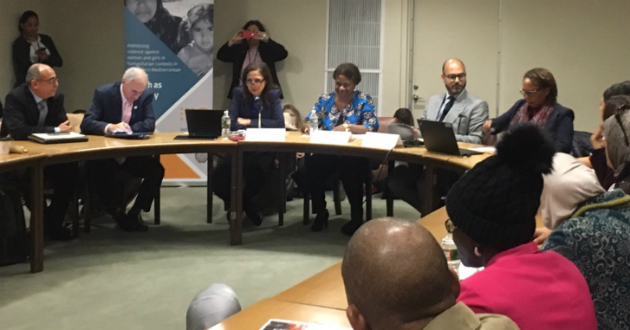
Expand Women’s Health: Enhancing integration, linkages and synergies between Sexual and Reproductive Health and Noncommunicable Disease programmes (Co-sponsored by Zambia, Denmark, WHO, UN Women)
This event highlighted the importance of NCDs as a leading cause of death among women globally, and in particular, the impact of breast and cervical cancers, rising rates of obesity in women of reproductive age, and mental health. WHO was represented by Mr. Werner Obermeyer, who stressed the multifaceted set of drivers that exacerbate this burden, such as limited access to health services in rural settings, lack of awareness, stigma and discrimination, and limited life choices. The panel further explored policies and effective multi-stakeholder partnerships that can bridge efforts to address this burden.

